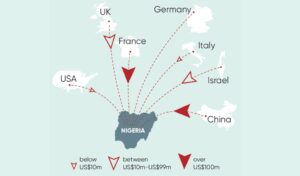Nigeria has been revealed as Africa’s largest customer of surveillance technology contracts, spending hundreds of millions of dollars annually, and at least US$2.7bn on known contracts between 2013–2022. This is the equivalent of $12 per Nigerian citizen.

The new research, published today by the Institute of Development Studies and the African Digital Rights Network, is the first comprehensive study to reveal the scale of surveillance technology being used by governments in Nigeria, Ghana, Malawi, Zambia and Morocco, and the US, China, EU, UK and Israel-based companies supplying it.
The surveillance technology has been used to spy on peaceful activists, opposition politicians, and journalists, singling them out for harassment, arrest and torture, in violation of international human rights law and supplier companies’ own self-policing measures.
The researchers reveal that Nigeria is a leading customer of every major surveillance technology they studied, including internet and mobile and internet interception, social media monitoring, biometric ID data and the so-called ‘safe city’ monitoring of citizens in public spaces. They also found that the Nigerian state permits far more government agencies to conduct surveillance than the other countries studied and has contracts with the each of the leading surveillance technology suppliers based in the US, China, EU, UK and Israel.
In Lagos and Abuja, the Chinese companies Huawei and ZTE provide safe city surveillance products for the Nigerian Government using extensive CCTV camera surveillance with facial and car number plate recognition.
Entitled ‘Mapping the Supply of Surveillance Technologies to Africa’, the report is published at a time of increasing unease about the checks and balances for the use of AI, and the potential for misuse by increasingly authoritarian governments.
The report calls for the abolition of rights-violating surveillance technologies and for the defunding of mass surveillance of citizens.
Tony Roberts, editor of the report and Research Fellow at the Institute of Development Studies, said:
“The research in Nigeria found contracts worth billions of dollars but that is just a fraction of what the true cost will be.
“Beyond the financial cost, there is creating huge personal costs for the journalists and activists, or regular citizens, unjustly tracked, arrested and detained – and often tortured – for just posting a message on social media.”
Tony Roberts, continued:
“Governments and companies supplying the surveillance technologies are getting away with flouting international treaties and their own self-policing measures. We currently have a ‘wild west’ of surveillance supply, where the few rules that are in place are not being followed.
“States are using surveillance technologies to create a chilling effect to suppress civil society and freedom of expression. To combat this, we urgently need action to establish robust legal frameworks to protect the human rights of citizens, and restrict the export of surveillance products.”
The researchers found differences between countries in Africa in their surveillance profiles. Ghana appears to have focused on mobile spyware and ‘safe city’ surveillance. Morocco has been an avid consumer of internet and mobile phone intercept technologies and has the unique distinction of having conducted mobile surveillance of its own king. Zambia’s huge investment in a Chinese ‘safe city’ surveillance system is a massive upgrade of its surveillance capabilities. Malawi’s investment in surveillance systems is modest compared to other countries studied.
Case studies: the human cost of digital surveillance technologies
In Nigeria, Solomon Akuma, a pharmacist, was arrested on 2 April 2020, in Aba, Abia State, for allegedly making a social media post critical of President Buhari and his late Chief of Staff, Abba Kyari. Akuma was held in detention for three months without trial. He was eventually brought before the courts for charges of terrorism, sedition, criminal intimidation of the president, and threat to the life of the president.
In Nigeria, Omoyele Sowore, a human rights activist and former presidential candidate found that the Nigerian government had deactivated his biometric identification in January 2022. This meant that his national identification card, permanent voter card, foreign passport, and driver’s licence were among the documents to be deactivated, preventing him from travelling, driving or voting.